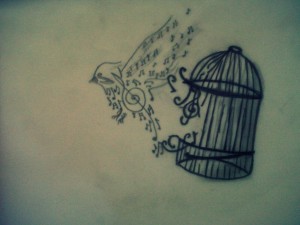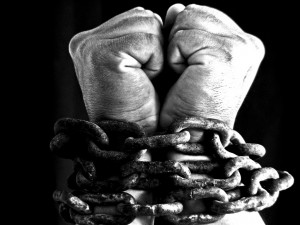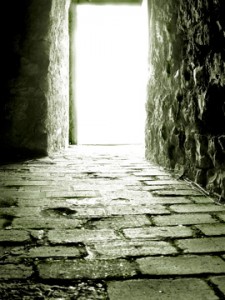
WARNING: This post is more sporadic, disjointed and ultimately more passionate than most of my posts. Hang in there and invest in the proposal…please… oh and comment, suggest books, ask questions. Now, more than ever, I need your help!
For surely I know the plans I have for you, says the Lord, plans for your welfare and not for harm, to give you a future with hope. (Jer 29:11)
Over the last year I’ve become more and more convinced that God is more interested in the present than He is in the future. I often sum up the idea by proclaiming the un-nuanced version; “I don’t believe in the future.” I don’t exist in the future, which is a healthy psychological position, and therefore I don’t participate in the activity of believing in that realm. I also don’t have trust in the future, I don’t have faith in this thing we call ‘future’. As well as both of these opinions I also don’t believe the future exists, i.e., It has not been created yet, it is not a static place or thing that we can in anyway grasp. The future is not reality. In most Churches the use of language about future is not fully explored.
What is ‘the future’?
The future is a designated time after this moment. We can call anything that may happen after now as ‘the future’. Its existence is considered inevitable due to the laws of time (tomorrow will happen after today). The inevitability of its existence doesn’t mean it exists currently, indeed the definition rejects any possibility of the future existing in the present for if it did it would be the present…
If we live in the belief that the future is a reality then we live within that belief system. For example:
Say someone believes that in the future they will be a doctor that belief impacts their present. They then believe that that future is inevitable and so the present moment and the decisions taken are changed in order to prepare for that reality. When that reality doesn’t arrive there’s a tear in their inner belief system. They had built a false reality around an imagined future and believed and trusted it would happen.
Trying to define the concept is difficult but I want us to rely on our simplistic understanding of ‘the future’ so we don’t have to enter into the physics of the future. We all feel at some time, divorced of the scientific thoughts, the sense of time just washing over us. Each moment has gone in a flicker of an eye and we enter into the next moment or it pushes onto us. Here is where I’d like to stop and ask a question.
Can we step into ‘the future’? or, do we step into ‘the future’?
You may ask what’s the difference between entering into the future or the future stepping into us? I believe it’s all in the interpretation. If you see yourself stepping into the future then there’s an implicit understanding that the future is a place/reality in which you can step into; it has become more concrete then just a mere concept. The onus is on you to make a decision as to whether you go or not. You have some element of control. We all know, however, that we will be in that moment whether we choose to or not. The future will become the present and the present moment will become the past. So the heavy concoction of sensing some control of time and its frightening inevitability makes us want to know the future before it happens. “If I am being forced to step into a room I want to at least know what’s in it.”
If, however, you see the future as coming at you like a freight train or a gentle stream then there is no control over it, implicit or explicit; all you have to do is stand there and deal with what comes. It is this idea that has been deeply liberating for me.
The passage from Jeremiah which we started with implies God is a puppet master of the cosmic order. The confusion happens when we acknowledge we also believe in free-will. What is free-will if God, ultimately will get His own way. That’s not true freedom, that’s manipulative! So how do we marry these two opposing views?
I wrote, last year, on God as the Divine Director and cited both Joseph Myers and T.J. Gorringe. The two posts (Divine Director (part I) and Divine Director (part II) posts) talk about the subject from a leadership perspective. Today I’d like to see it from a more general perspective.
What does God want me to do? What are His plans for me, plans to prosper me and not to harm me?
I’ve had so many conversations with people who are desperately trying to figure out what to do with their lives (one of those people was me!) There are so many options and choices to make; work, relationships, houses, money, religion, etc. We all have to make the ‘right’ choice and God is interested in the choices we make because the choices we make define who we are and our priorities. But what if we state that the future doesn’t exist yet and that any choice we make in the present directly impacts the creation of the future?
We create the future.
Take improvisation in drama. As an actor you stand on stage and, in order to create a narrative, you have to make a decision, you have to impact the story. This is deeply frightening as you stare into the emptiness of the next moment. You don’t know what is going to happen and the more you remain silent and frozen the larger that abyss becomes. There’s great wisdom in the slightly frustrated director’s command, “Do anything.”
The truth is it doesn’t matter what you do in that moment, what matters is how you do it. The question we must ask when making decisions in the present is not “Is this what God wants?” but “Is this in line with the character of Christ?”
So what are God’s ‘plans’? In this passage the word for ‘plans’ can be translated as ‘thoughts’. In the Hebrew Bible it is translated as ‘For I know the thoughts I am having for you…” “I know what I think of you.” It is more about the character of the person rather than their action.
What if following Jesus isn’t about asking What Would Jesus Do but rather How Would Jesus Be then the choices we make are important not because of the actual decisions but whether they’re made in line with the character of Jesus. God requires us to live this moment in the character of Jesus. Do not live in the future for it doesn’t exist yet, live in this moment. ‘Do not worry about tomorrow…’ The future will happen and when it does, if you live like Jesus, then all will be well. If you make a decision, God will bless it if you make it whilst being faithful to the character of Christ.
As a director, in improvisation, I don’t care what actor’s say or do as long as they do so with consistency of character. Jesus, likewise, criticizes religious hypocrisy a lot because their actions are not in line with their belief. They maybe making good decisions in line with the law but not in line with the character of God.
Do I marry this person or not? It doesn’t matter. What matters is how you marry them and consequentially fulfill those promises that matter. Or how you separate. Faithfully follow God’s commands; ‘Love God and love your neighbour.’
What do I do for a living? It doesn’t matter. What matters is how you live as whatever you become. Faithfully follow God’s commands; ‘Love God and love your neighbour.”
Does God know the future? Yes. He knows everyone’s decisions and the consequences of everyone’s action colliding together. Can He fully control the future? No because He has given His people free-will.
I hope you can begin to see why I’m struggling to write this book! So many ideas and implications it’s hard to contain them all. I guess I want everyone to know this; Do not worry about what you will do or what you will say. Life is not about which path you walk but the way you walk it. Jesus is ‘the way’ not path so walk like Him. The future will arrive inevitability and will ask you to make choices but you cannot predict what those choices are so concern yourself with making decisions now in this moment.
We’ve not been able to get into the subject of prophecy, eschatology, discernment. At the end of the day (it gets dark!) God wants us to share responsibility for our decisions, He wants you to choose. He can’t control what you choose but He can advise and give you strength how to choose.
I will finish on some lyrics from Baz Luhrmann’s ‘Everybody’s Free (to wear sunscreen)’:
Don’t worry about the future; or worry, but know that worrying is as effective as trying to solve an algebra equation by chewing bubblegum. The real troubles in your life are apt to be things that never crossed your worried mind; the kind that blindside you at 4pm on some idle Tuesday… Don’t feel guilty if you don’t know what you want to do with your life…the most interesting people I know didn’t know at 22 what they wanted to do with their lives, some of the most interesting 40 year olds I know still don’t.


 Where he came from, neither of them knew. How he got past their captors; who could say? He was either a fraud, one of the warders provoking them for his own amusement; or their captors had fled leaving the cell unguarded; or it was a miracle. None of this mattered much as he walked over to them and spoke.
Where he came from, neither of them knew. How he got past their captors; who could say? He was either a fraud, one of the warders provoking them for his own amusement; or their captors had fled leaving the cell unguarded; or it was a miracle. None of this mattered much as he walked over to them and spoke. Through the doors they saw their guards sleeping soundly. It seemed so strange – no – illogical that they could slumber during a rescue mission in the jail they were meant to watch. The whole incident was feeling so mysterious and implausible; a dream with no reason. Yet this man kept leading them down the corridor towards a bright light; the final exit to freedom.
Through the doors they saw their guards sleeping soundly. It seemed so strange – no – illogical that they could slumber during a rescue mission in the jail they were meant to watch. The whole incident was feeling so mysterious and implausible; a dream with no reason. Yet this man kept leading them down the corridor towards a bright light; the final exit to freedom.


